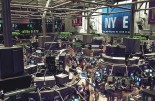Bob Homan: Very surprising, how investors can be surprised
Bob Homan: Very surprising, how investors can be surprised

This column was originally written in Dutch. This is an English translation.
By Bob Homan, Head of the ING Investment Office
Modern portfolio theory assumes that in an efficient market all available information is incorporated into prices almost immediately. The result: every course is in fact the right one.
Personally, I think there is something to be said about that speed. But by the time everyone really knows or can know something, it will be in the race. However... I'm always so surprised when prices suddenly react sharply to things I assumed were common knowledge.
In the past earnings season, for example, analysts wrote messages along the lines of: 'The numbers were bad, but everyone saw that coming.' Subsequently, the share price is many percent lower. Or a company that issues a profit warning on Monday, after which the share price drops and then loses the same percentage on Friday, after it presents the corresponding figures. It is anecdotal evidence showing that not everything is always included in the price.
Now that I'm writing this, I'm suddenly very curious about the market reaction to the figures for the second half of the year. I don't know exactly how they will turn out, of course, but I do know that the dollar was strong against the euro in the second half of 2022 – there was even talk of parity. The euro has now become about 10% stronger and this should be reflected in the company figures in the year-on-year comparisons.
The effect: European corporate figures are negatively affected. On the one hand due to the stronger euro, which makes competition with American companies more difficult, and on the other hand the translation effect, whereby the profits made by European companies in the US in dollars contribute 10% less to the result in euros. The reverse, of course, applies to American companies whose European contributions suddenly yield 10% more.
Is this a surprising insight? No. This has been neatly incorporated in the analyst expectations for the second half of the year: European profits are expected to fall sharply, while an increase is expected for the US. So I'm not surprised if this scenario unfolds soon. Perhaps I will not be surprised by the market reaction this time either.









